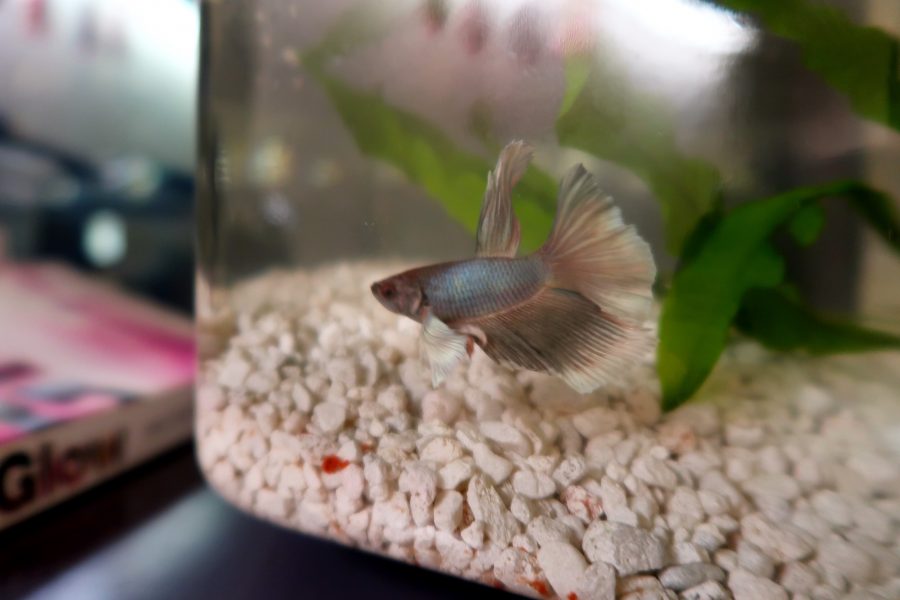“This is Martin,” CAS sophomore Jake Schneebaum said, holding a picture of his late betta fish. “He was an angel. May he rest in peace.”
NYU residence halls allow students to keep tanks with up to 10 gallons of water, and getting a fish can be a creative way to add color and life to a room. But for some students, owning a fish is far more than decoration.
Schneebaum kept Martin in a five-gallon tank last year in Lipton Residence Hall.
“Martin was a special-needs fish,” he said. “He had really bad separation anxiety, so I would need to be with him almost all hours of the day.”
For Schneebaum, the relationship he developed with Martin made the experience worthwhile.
“Before I had Martin, I never felt like I was truly part of a community,” he said. “But once I had him, it was like him and I against the world, and I could do anything with Martin.”
For CAS sophomore Marissa Rosa, buying her betta fish Archibald wasn’t for an individual relationship but a way for her and her roommates in Gramercy Green Residence Hall to connect as a group.
“It’s something we all share, take responsibility for,” she said.
Archibald is a happy little guy, and Rosa said he enjoyed his moment in the spotlight when a photographer started snapping pics of him.
“He’s loving it,” Rosa said. “He’s, like, posing.”
Archibald was so at ease, in fact, that a few days ago he made a bubble nest. Rosa explained that betta fish blow bubbles to form a nest to lay their eggs on when they’re content and ready for children.
“My roommates were like, ‘Did someone spit in the tank? What is that thing?’” she said. “But my mom loves these fish, so she was like, ‘Oh my gosh, he made a bubble nest!’”
Archibald and Martin seemed perfectly fine in their small tanks. But of course, for every rule there is a rule-breaker. One Gallatin sophomore, who wished to remain anonymous to avoid repercussions from NYU, told the story of the illegal 40-gallon tank kept in their Broome Street Residence Hall dorm. They’d won their fish Pietr in a game at a street market. Anxious to keep him alive, their research had led to buying an enormous tank on Craigslist and hauling it from Brooklyn to Manhattan on the subway.
“He was very happy at first in here, you know, it’s like his little McMansion,” the student said. “Everybody was like, ‘Why are you getting a big tank?’ I was like, ‘I don’t know! Everybody on the internet’s saying he needs a big tank and he’s my little boy, and he’s gonna live the high life. He’s never gonna know pain.’”
While all three students said that fish can be a relaxing pet for any college student, they stressed that fish ownership is still a responsibility.
“I definitely think that you need to be capable of feeding a fish every day,” Schneebaum said. “If you know that you’re not going to be able to be in the dorm every day, you shouldn’t have a fish because their tanks need to be cleaned — there’s a lot, you know. But I think if someone is able to fit the few needs that a fish has into their schedule, it’s a pretty therapeutic pet to have, especially in college.”
The anonymous sophomore agreed with the time commitment, and stressed caring for the mental health of the fish as well.
“[It’s] whether or not you’re gonna be able to put in the time, the emotional energy, to sit with your fish, to tell your fish about your day, to listen to your fish about their day,” the student said.
They also added that it can be surprisingly pricey.
“I accidentally spent like $250 on this fish,” they said.
While an expensive rule-breaking tank setup is probably not feasible for most students, it’s a measure of how much students care about their aquatic companions and how hard they’ll work to ensure their health and happiness.
NYU students’ fish can mirror the same emotional struggles many college students wrestle with — sometimes we all feel a little alone, like we’re living in an empty tank. But having someone on your desk experiencing the same things, happy to hear you talk and sing to them, is a good reminder to enjoy life and just keep swimming.
A version of this article appears in the Tuesday, Oct. 15, 2019 print edition. Email Sabrina Choudhary at [email protected].

























































































































































